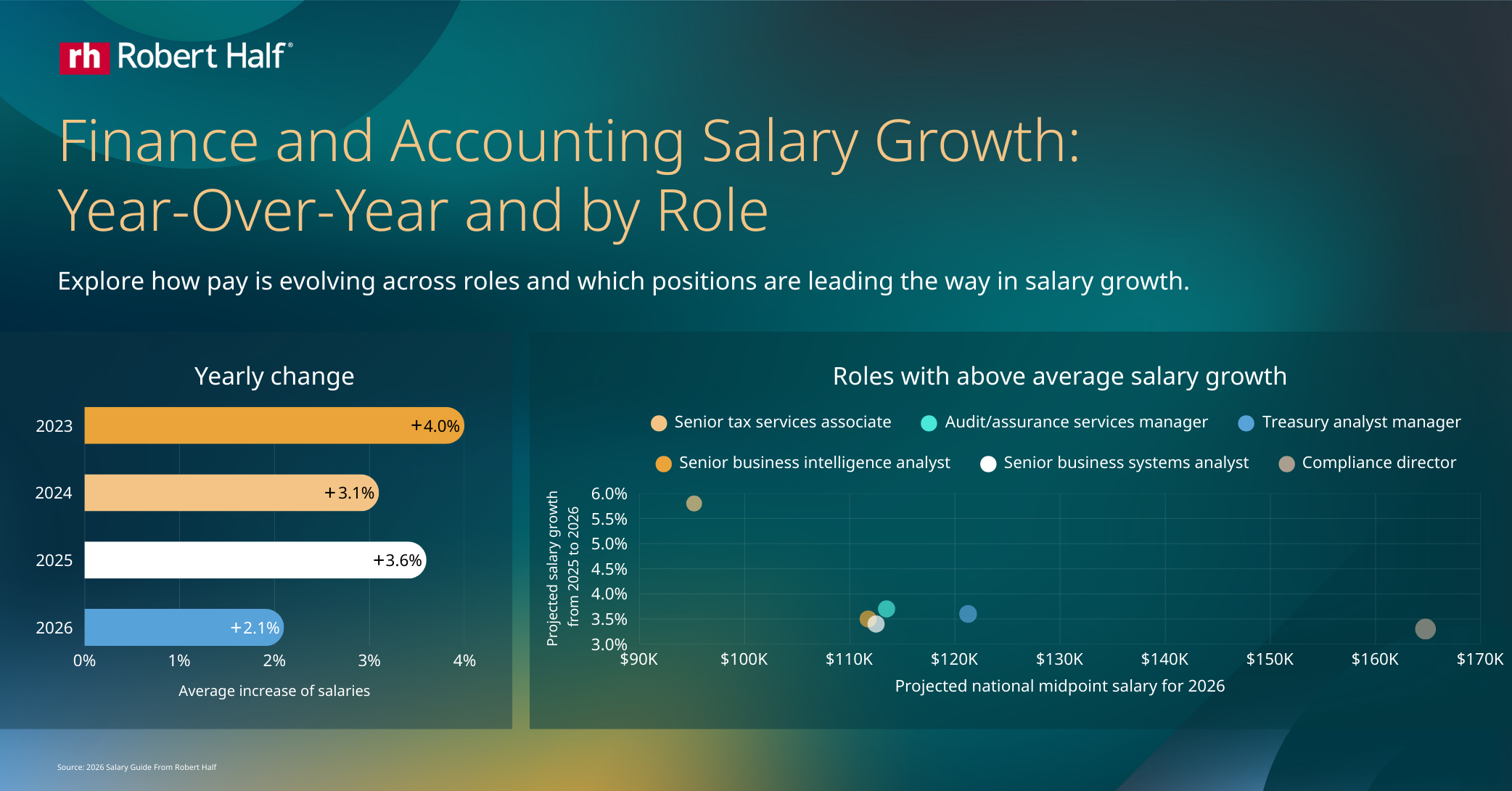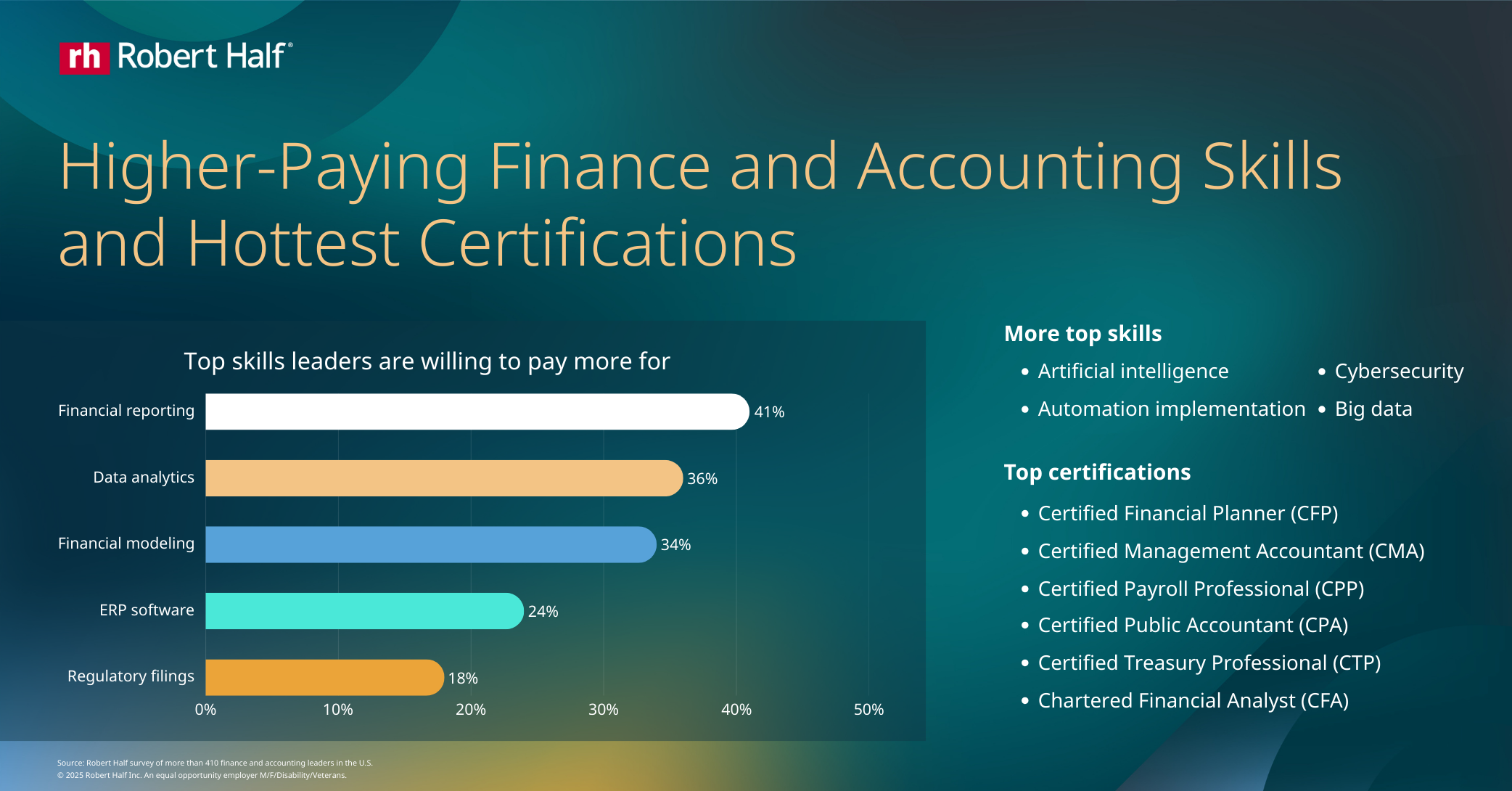Access the Salary Guide
Understanding compensation trends is more critical than ever—whether you’re a hiring manager competing for skilled talent or a finance and accounting professional navigating today’s competitive labor market. While overall salary growth has moderated compared to recent years, opportunities are expanding for those who focus on the skills and strategies that drive success.
The 2026 Salary Guide From Robert Half reveals that finance and accounting salaries are expected to rise an average of 2.1% year over year. What matters most is not just the percentage increase, but where employers are investing in specialized talent and how professionals can align their career paths to meet that demand.
Finance and Accounting Salaries 2026: Roles and Skills in High Demand
Finance and accounting salary growth in context
Looking back shows how the market has shifted—and where opportunities now lie. Now, in 2026, finance and accounting roles are projected to average +2.1% growth.
Although overall growth has slowed in projections, this is far from discouraging. Instead, it signals a move toward more targeted opportunities for advancement. For employers, success depends on knowing where to direct resources strategically. For job seekers, it means focusing on the skills most likely to lead to higher pay and stronger career paths.
Roles driving higher salaries in finance and accounting
Several finance and accounting positions stand out for above-average projected growth. These roles reflect opportunity areas where employers are willing to pay more and where job seekers can grow careers. The common thread is clear: professionals who deliver regulatory expertise, financial transparency and actionable insights are in high demand. The graphic below highlights both the year-over-year salary trends and the finance and accounting roles projected to see above-average growth in 2026.
 Finance and Accounting Salary Growth: Year-Over-Year and by Role
Explore how pay is evolving across roles and which positions are leading the way in salary growth.
Yearly change:
2023: +4.0%
2024: +3.1%
2025: +3.6%
2026: +2.1%
Roles with above-average salary growth (projected growth from 2025 to 2026):
Senior Tax Services Associate — +5.8%, $95,250
Audit/Assurance Services Manager — +3.7%, $113, 500
Treasury Analyst Manager — +3.6%, $121,250
Senior Business Intelligence Analyst — +3.5%, $111,750
Senior Business Systems Analyst — +3.4%, $112,500
Compliance Director — +3.3%, $164,750
The scatter plot visualizes each role’s projected salary growth alongside its projected 2026 national midpoint salary.
Source: 2026 Salary Guide from Robert Half.
Finance and Accounting Salary Growth: Year-Over-Year and by Role
Explore how pay is evolving across roles and which positions are leading the way in salary growth.
Yearly change:
2023: +4.0%
2024: +3.1%
2025: +3.6%
2026: +2.1%
Roles with above-average salary growth (projected growth from 2025 to 2026):
Senior Tax Services Associate — +5.8%, $95,250
Audit/Assurance Services Manager — +3.7%, $113, 500
Treasury Analyst Manager — +3.6%, $121,250
Senior Business Intelligence Analyst — +3.5%, $111,750
Senior Business Systems Analyst — +3.4%, $112,500
Compliance Director — +3.3%, $164,750
The scatter plot visualizes each role’s projected salary growth alongside its projected 2026 national midpoint salary.
Source: 2026 Salary Guide from Robert Half.
The value of specialized skills in finance and accounting
It’s not just the role you hold—it’s the skills you bring to it. According to the Salary Guide, 87% of finance and accounting leaders offer higher pay to candidates with specialized skills compared with those without.
Core skills like financial reporting, data analytics, financial modeling and ERP expertise are consistently rewarded with higher salaries. Employers also increasingly value skills in AI implementation, cybersecurity and data engineering as finance functions embrace digital transformation.
For employers, this highlights the chance to build teams equipped for digital transformation and compliance. For job seekers, it’s a roadmap to earning potential and long-term stability.
The finance and accounting certifications that boost salaries
Certifications can open doors to higher-paying roles and greater career mobility. Employers see them as proof of specialized knowledge, while job seekers can often use them to negotiate
For job seekers, pursuing these credentials can accelerate advancement. For employers, supporting certification programs strengthens retention and builds capability in-house. The graphic below highlights some of the most valuable skills and certifications for finance and accounting professionals in 2026.
 Higher-Paying Finance and Accounting Skills and Hottest Certifications
Top skills leaders are willing to pay more for:
Financial reporting — 41%
Data analytics — 36%
Financial modeling — 34%
ERP software — 24%
Regulatory filings — 18%
More top skills:
Artificial intelligence
Automation implementation
Cybersecurity
Big data
Top certifications:
Certified Financial Planner (CFP)
Certified Management Accountant (CMA)
Certified Payroll Professional (CPP)
Certified Public Accountant (CPA)
Certified Treasury Professional (CTP)
Chartered Financial Analyst (CFA)
Source: Robert Half survey of more than 410 finance and accounting leaders in the U.S.
Higher-Paying Finance and Accounting Skills and Hottest Certifications
Top skills leaders are willing to pay more for:
Financial reporting — 41%
Data analytics — 36%
Financial modeling — 34%
ERP software — 24%
Regulatory filings — 18%
More top skills:
Artificial intelligence
Automation implementation
Cybersecurity
Big data
Top certifications:
Certified Financial Planner (CFP)
Certified Management Accountant (CMA)
Certified Payroll Professional (CPP)
Certified Public Accountant (CPA)
Certified Treasury Professional (CTP)
Chartered Financial Analyst (CFA)
Source: Robert Half survey of more than 410 finance and accounting leaders in the U.S.
Industries paying more for finance and accounting skills
Some industries are seeing stronger competition for finance professionals, creating salary advantages for candidates who explore opportunities across sectors.
Financial services: High demand for compliance and reporting expertise
Healthcare: Emphasis on financial oversight and patient data security
Manufacturing: Transformation in supply chain, cost control and technology
Nonprofit: Accountability in grant and donor reporting
Job seekers who align with these industries may find higher pay and broader career options. Employers in these fields must be ready to compete aggressively for finance talent with in-demand skills.
Emerging roles in finance and accounting
New roles are shaping the profession, blending finance knowledge with advanced technology. For forward-thinking job seekers, these represent entirely new career paths. For employers, they offer ways to innovate.
AI governance and risk officer: Develops frameworks for responsible AI use in financial decision making
Cognitive accountant: Automates expense categorization and anomaly detection, and gathers real-time financial data
Real-time financial data engineer: Builds infrastructure to process live data streams and support agile forecasting
These positions are still evolving, which makes setting competitive salaries challenging. That’s why 41% of leaders turn to recruiters for guidance. Forward-looking employers who embrace these roles early will gain an edge, while job seekers who acquire AI and data expertise will be positioned for rapid career growth.
F&A upskilling opportunities: A path to success for employers
Employers see retention, faster hiring and stronger skill sets as opportunities to strengthen their teams. To achieve these goals, they are focusing on key challenges:
85% are working to retain top talent
80% need to hire skilled candidates faster
76% see critical skills gaps on their teams
74% are concerned about meeting pay expectations
While hiring new talent remains essential, one solution also lies in upskilling. Training employees in areas like data analytics, ERP software and automation builds loyalty, strengthens teams and reduces the need to compete solely on salary. For employers, investing in development is one of the most reliable paths to long-term success.
Finance and accounting stands out as a field with measured, sustainable growth and consistent demand for specialized skills—a strong signal for professionals planning long-term careers.
What this means for employers
Direct pay toward value-driving skills: Offer higher salaries where expertise creates compliance, efficiency or insight
Support certifications: Backing CPA, CMA or CFA credentials shows commitment to employee growth and strengthens retention
Build a learning culture: Upskilling keeps your workforce engaged and ready to meet evolving business needs
What this means for job seekers
Highlight higher-paying skills: Position yourself around analytics, ERP or financial reporting— but only if these areas accurately reflect your skills and experience
Pursue certifications: They strengthen your resume and increase negotiating power
Target opportunity-rich industries: Healthcare, financial services and manufacturing are actively investing in finance talent
Explore emerging roles: Early adoption of AI and data skills can fast-track career growth
Total compensation matters in finance and accounting
Salary is only one part of the package. In finance and accounting, where competition for specialized talent is strong, total compensation—including perks and benefits—often makes the difference in attracting and retaining professionals.
For employers, that means thinking like candidates. CFOs, controllers and other finance leaders increasingly weigh total compensation packages, not just salary, when recruiting or accepting offers. Bonuses, retirement plans, hybrid work options and professional development support are now standard expectations. Companies that go further—offering student loan repayment, paid volunteer days or wellness stipends—often stand out.
For job seekers, evaluating total compensation is just as critical as reviewing base pay. A role with slightly lower salary but stronger 401(k) matching, flexible work options and leadership development opportunities may deliver greater long-term value than a higher paycheck alone.
In a market where salary growth has moderated, total compensation strategies are the key to differentiation—helping employers win top finance talent and professionals build sustainable careers.
Opportunities ahead in finance and accounting
Finance and accounting in 2026 is full of opportunity. While average salary growth is modest, the demand for specialized skills, certifications and forward-looking roles is creating real pathways for success.
For employers, this is the time to invest in upskilling, certifications and targeted compensation strategies. For job seekers, it’s a chance to use skills and credentials to secure higher pay and build a future-ready career.
As finance and accounting roles continue to evolve, the professionals and employers who focus on skills and strategy will be the ones who thrive.









